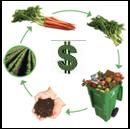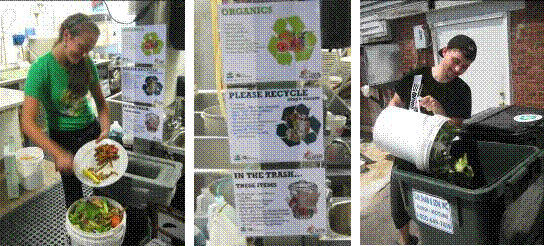

|
DEVENS ECO-EFFICIENCY CENTER Helping area businesses and organizations reduce their environmental impacts and operating costs through education, collaboration and technical assistance. |
|
Composting Services |
|
The Devens Eco-Efficiency Center is proud to launch a range of services to help facilitate the implementation of organics separation programs in food service establishments in Devens and area towns. The Facts…. · Food waste represents between 40-80% of the solid waste generated by hotels, schools, restaurants and food stores. · Between .5 – 1.5 pounds of organics are generated per meal served in a restaurant. · Nearly 900,000 tons of food scraps and wastes are generated each year in the state. · A new state regulation expected to go into effect July 2014 will ban the disposal of organics by facilities that generate more than one ton of food waste per week.
Economic and environmental benefits of composting: · Potentially reduce waste management expenses, depending on amount of food waste and hauler service. · Lower water, sewer and electric expenses with less use of the garbage disposal. · Inspire pride amongst employees and attract new customers by incorporating more eco-friendly operating practices. · Create a new nutrient-rich material that will be used to improve soil health, erosion conditions and garden growth.
Let the Eco-Efficiency Center help you implement a composting program: The Devens Eco-Efficiency Center is offering technical assistance to interested organizations to support the creation of a successful composting program. The technical assistance includes: · Site visit to assess logistics, identify materials and quantity that can be diverted · Collection of waste data and calculation of cost analysis/projection · Assistance with hauler identification, arrangements and negotiations · Staff training and customized signage
To take advantage of these offerings or to learn more, contact Dona at donaneely@ecostardevens.com or 978-772-8831 x3304.
Attention restaurant and meeting facility managers: Click Here for an overview of why you should consider implementing a compost program. “How to compost" is another fact sheet that covers frequently asked questions, program implementation and logistics, employee education, post evaluation, and more. There is also a worksheet that can be used to identify materials to be diverted from the trash and estimate new disposal costs with the compost program and potentially improved recycling. These documents can help you understand what’s involved and how a program can fit in your venue.
Composting in Action! The Gardner Ale House captures 70 tons of food waste annually and the material is repurposed for animal feed. The Great American Grill (Devens) diverts 21 tons of organic material from their trash, which is processed into landscaping material. Click on the above links to learn about how they implemented their compost programs and how the diversion programs have benefited the restaurants.
The Gardner Ale House recently reduced its solid waste by 72% with the implementation of compost and recycle programs.
“At first the staff was challenged by what goes where questions, but the separating soon became habit and they now don’t know how to do it any differently and would not be happy if the program stopped!” Rick Walton, Gardner Ale House Owner
Employees at the Hilton Garden Inn have also embraced the composting program and currently divert over 800 pounds of food waste each week and reduced their solid waste service needs by 50%! Read more about their program in the news article published in the Ayer Public Spirit. |

|
The Devens Eco-Efficiency Center hosted a workshop on composting and its cost/benefits, how you can start your own composting program, and some of the tools and resources available to assist you in your efforts. View the powerpoint presentation shared with food service providers. |



